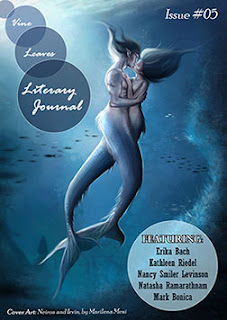As a co-founder and editor of Vine Leaves Literary Journal, I have read my fair share of clichéd submissions. And I'm afraid to say, that most of the time, they make me wince.
As a writer, it is likely hard to comprehend how overwhelming these clichéd submissions can get. You are only one person after all, with one cliché in front of you, and it's logical to think, Oh, it'll be all right, surely there won't be any other subs like this. But you would be surprised. What you need to think is: Am I really going to be noticed amongst an inbox full of 300-400 other submissions if I'm writing about the sea breeze, and quiet dark nights?
Vine Leaves Literary Journal has been around for more than a year now. And the clichés (especially in poetry) that most frequently overwhelm us are:
- gardens/plants (pretty red poppies, bees, roses and Eden)
- sun/moon/stars (shining, glistening on sand or water)
- beating hearts (oh I love you so much my heart is racing)
- quiet nights (as I caress your cheek, as soft as a baby's bottom)
- gentle breezes (I close my eyes and feel your presence)
- oceans/beaches (my toes dig into the warm sand)
- weather/seasons (birds chirping in spring, heat waves rising off the road)
However, if you are sure that you have written about these things in a unique way, we're totally open to reading about them. But trust me, we will be extra critical.
For an example of one unique way to write about gardens, take a look at The History of Dirt, by Allie Marini Batts, from Issue #03, page 37. This WOWED me.
So how can we twist the above clichéd topics into interesting reading?
For starters, use objects as metaphors for emotions or personality traits; plants in a non-garden context to attract attention and intrigue; give pretty things ugly qualities, and vice versa; compare love to a simple gesture that isn't saccharine; instead of talking about the quiet night, find a quiet detail to draw attention to, an elderly man kicking a newspaper in an abandoned street perhaps, and his echoing grunt. Think opposite, think unpredictable. Tweak a common feeling with a unique bent, experiment with poetic prose.
Sure, clichés exist because they come from real life, and you may argue that they are 'relatable.' But the way in which one experiences things isn't always the same. As writers, it's your duty to make your readers see through a unique pair of eyes. Tell me, which of the following excerpts is the most clichéd? And which is more interesting to read?
As I step foot onto the sand, I realize I'm ready to wipe the slate clean, to start again in a new town where I no longer feel the weight of regret on my shoulders, or the desire to runaway; a place where I can accept who I am.
As I step foot onto the sand, I realize I’m ready to wipe this regret from my skin; to immerse myself in a new ocean, where my desire for fleeing this emotional cage hides like a mermaid ambivalent about growing legs.
What other clichés can you think of that you persistently see in writing? Or better still, what have you read that uses a cliché in a unique way?
Need more help with your writing? Why don't you try Jessica's pocket guide, Show & Tell in a Nutshell: Demonstrated Transitions from Telling to Showing?
About the Author:
If Jessica Bell could choose only one creative mentor, she’d give the role to Euterpe, the Greek muse of music and lyrics. This is not only because she currently resides in Athens, Greece, but because of her life as a thirty-something Australian-native contemporary fiction author, poet and singer/songwriter/guitarist, whose literary inspiration often stems from songs she’s written.
She is the Co-Publishing Editor of Vine Leaves Literary Journal and annually runs the Homeric Writers’ Retreat & Workshop on the Greek island of Ithaca. She makes a living as a writer/editor for English Language Teaching Publishers worldwide, such as Pearson Education, HarperCollins, MacMillan Education, Education First and Cengage Learning.
Visit Jessica's blog, The Alliterative Allomorph, and connect with her on Facebook and Twitter.















8 comments:
Point well taken. I try to avoid them, and cringe when someone else notices one I've missed in a rough draft.
Funny you should use the sand/ocean. Last week, I wrote a Magpie Tale prompt from a photo of the ocean. While I think mine was different, many other people who participated did use the "toes in the sand" in their poetry or prose. And I wondered if they noticed their commonalities as they read one another's pieces.
It's funny, isn't it, how glaring they become when you put a lot of people's work in the same basket :-)
I was on the seashore this weekend, and I did dig my toes into the sand, and even as I was doing so, I realized how cliched it was!
Yes, they do come from real life, but if everyone has the same experiences, and if everyone writes about the same experiences in exactly the same why, why should someone read what they write instead of writing it themselves?
Great post. Thank you.
I'm sure I'm guilty of using them. Good examples to think about.
Guilty as charged. Thanks for the reminder and great examples, Jessica.
Super Like! Great one using of Sand loved it! i have title for this "2nd Turn".
Thanks
Oy. You've hit on some of the most common offenders, for sure! I advocate the use of shock collars for people who use tired comparisons and stock phrases.
"Our love was burning like fire OWWWW!"
;-)
Great examples. I'm sure that I've used some here or there.
Post a Comment